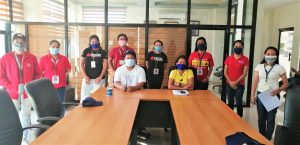
Bayanihan is a Filipino term for teamwork. But for Filipinos, Bayanihan has a deeper meaning for it also symbolizes pagmamahal sa kapwa at pagmamahal sa bayan or patriotism. Traditionally, Bayanihan is practiced when a certain family is having a house makeover or is going to transfer to another place, and everyone in the neighborhood gives a helping hand in the process.
Bayanihan is an act of kindness wherein a certain person or group of people offer their help without asking for payment in exchange for their services. Bayanihan is also exercised during calamities wherein neighbors are helping each other in supplying the needs of everyone in the community. But sadly, as the time went by, the practice of Bayanihan is slowly fading away, especially in urban parts of the country.
But nowadays, due to our current pandemic that the country is facing, Bayanihan is slowly making its mark – it is now being revived and is even making the rounds on social media. Netizens are posting their act of Bayanihan through helping those who are greatly affected by the Enhanced Community Qurantine because of the COVID-19 pandemic.
The Philippine government, headed by President Rodrigo Roa Duterte , crafted the Bayanihan to Heal as One Act (Republic Act 11469). It is a law which aims to “provide an emergency subsidy to around 18 million low-income households: provided, that the subsidy shall amount to a minimum of 5,000 pesos to a maximum of 8,000 pesos a month for two months: provided, further, that the subsidy shall be computed based on the prevailing regional minimum wage rates: provided, finally, that the subsidy received from the current conditional cash transfer program and rice subsidy shall be taken into consideration in the computation of the emergency subsidy as provided for on this Act,” as stated on the Section 4 C of the said law.
The Department of Social Welfare and Development (DSWD), through its Field Offices, acted on the guidelines through the Joint Memorandum Circular in the implementation of the program. DSWD has been tasked to distribute financial subsidy through Social Amelioration Programs (SAP) to the most affected families belonging to the informal sector. Due to a hectic timeline, the Field Offices was faced with great challenges. So the agency turned to its different partners to ensure that the implementation would be effective.
With the help of the different stakeholders, most specifically the Local Government Units (LGU), through their City/Municipal Social Welfare Development Office (C/MSWDO), and other government agencies, DSWD had high hopes in the implementation of the SAP.
One of the municipalities in Caraga who handled the implementation of SAP confidently was the Municipality of Rosario, Agusan del Sur. According to Jeanette Celedio, the MSWD officer of Rosario, the SAP implementation in their municipality was very challenging, but they were able to manage it well. She said that right after they had their orientation (through teleconference) with the DSWD Field Office, she immediately had a meeting Mayor Jupiter Abulog and Municipal Administrator Cristina Basan to come up with strategies on how to implement the program.
“After sa teleconference namo with Regional Director Lim, nag-meeting dayun mi ni Mayor with Admin unsaon namo pag-implement sa SAP. Then katong naa na mi plan, gimeeting dayun namo ang mga barangay captains with the DILG (After the teleconference with the [DSWD] Regional Director Lim, we immediately had a meeting with our Mayor and Administrative Officer on how to implement the SAP. After that, we set a meeting with the barangay captains together with the DILG).”
One of the strategies they had during the payouts was that they did the house-to-house distribution of the Php5,000 subsidy. Mayor Abulog along with Municipal Administrator Basan ordered the different division chiefs of the LGU to act as the paymasters, and were accompanied by two representatives from the Armed Forces of the Philippines (AFP), two Police Officers, the Purok Chairperson, one Barangay Kagawad, one Barangay Health Worker, a representative from the MSWDO, and two representatives from the augmented staff of DSWD FO Caraga.
The team approach in the distribution of the subsidy was in a way a Bayanihan approach since it fast-tracked the distribution process. More hands meant shorter time of the transactions. One person would prepare the forms, another would prepare the payroll where the beneficiary would sign, another would take the photo of the beneficiary, another would check the Social Amelioration Card/Form. And above it all, there were those who made sure the team was kept safe, especially that they were bringing a large amount of money.
This approach was also advantageous to the team since there are members who knew the beneficiaries well, especially those who are from the barangay. They could easily identify recipients who have been poorly validated, and were not qualified. They easily took them down from the list of beneficiaries. And also, some of the members of the team were quick to take in grievances or queries from the community. So they were quick to address the issues properly.
The Municipality of Rosario showed the Bayanihan spirit through their strategy in implementing the SAP. All were working hard, from members from the barangay up to the high ranking officers from the LGU. The SAP implementation has been a good venue to rekindle the spirit of camaraderie and cooperation among those who serve the welfare of the people.
The Municipality of Rosario has indeed risen above the challenges of this pandemic, and it is through Bayanihan that they were able to surpass the challenges.###

